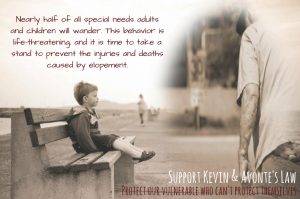Originating nearly four years ago, the piece of legislation we have come to refer to as Kevin and Avonte’s Law is being reintroduced for voting after failing to pass during the last session of the 114th Congress due to time constraints after edits were made to reflect privacy issues. Late last week, three bipartisan Representatives from New Jersey, California, and Pennsylvania introduced H.R. 4221 to the House of Representatives during the first session of the 115th Congress; S. 2070, a Senate bill was also introduced the same day. After nearly a year of silence on the matter, the news of this legislation comes as a great relief, and is hopefully a step in the direction of a new, life-saving law.
 As we know, the bill was named “Kevin and Avonte’s Law” after two autistic boys who died after incidences wandering. Kevin Curtis Wills who was just 9 years old when he jumped into the Raccoon River in Iowa and drowned in 2008. And Avonte Oquendo a nonverbal, New York City 14-year-old autistic teenager who drowned in the East River after slipping out of his school in October 2013. The goal of this legislative bill is to avoid similar tragedies.
As we know, the bill was named “Kevin and Avonte’s Law” after two autistic boys who died after incidences wandering. Kevin Curtis Wills who was just 9 years old when he jumped into the Raccoon River in Iowa and drowned in 2008. And Avonte Oquendo a nonverbal, New York City 14-year-old autistic teenager who drowned in the East River after slipping out of his school in October 2013. The goal of this legislative bill is to avoid similar tragedies.
H.R. 4221 proposes a reauthorization and amendments to the Missing Alzheimer’s Disease Patient Alert Program, which was introduced in 1994 to assist organizations that design and operate proactive programs to protect and locate missing patients with Alzheimer’s disease and related dementias. With the proposed amendments, the program would now be referred to as the Missing Americans Alert Program, a grant program to reduce the injury and death of missing Americans with dementia and other developmental conditions, such as Autism Spectrum Disorder.
If passed, the bill would authorize the Bureau of Justice Assistance, through a federal grant program, to award qualified agencies and organizations funding to assist in the protection of special needs individuals in relation to the life-threatening behavior of wandering. The grant program will award $2,000,000 each year. Funds will be awarded to health care agencies, state and local law enforcement agencies, or public safety agencies and nonprofit organizations (1) to assist such entities in planning, designing, establishing, or operating locally based, proactive programs to prevent wandering and locate missing special needs individuals, and (2) to assist such agencies in designing, establishing, and operating locative (non-invasive) tracking technology programs for special needs individuals. Preference will be given to law enforcement or public safety agencies that partner with non-profit organizations
Grant programs like such have proven to be very successful. In previous years, Project Lifesaver was awarded funds through the Missing Alzheimer’s Patient Assistance Program, a federal grant program provided by the Bureau of Justice Assistance. Through an initial grant and two supplemental grants, Project Lifesaver was awarded $1,800,000 in an effort to expand the availability of our program and assist in the protection of those with Alzheimer’s disease throughout the United States. Through this grant program, Project Lifesaver was successfully able to:
-
Implement 242 new member agencies throughout the United States;
-
Train and Certify 1,598 first responders as Electronic Search Specialists; and
-
Distribute 2,771 transmitters to persons with Alzheimer’s Disease.
Did you know that autism now affects 1 in every 68 children, and among those diagnosed with autism nearly half of those individuals will wander? Did you know that there are now more than 5 million Americans suffering from Alzheimer’s or some other form of Dementia, and of those, 60% will wander from a safe place? Wandering is a common behavior among the special needs community; a life-threatening behavior whose presence and consequence has increased significantly over the last few decades, making the necessity for this bill stronger than ever.
When an elopement episode occurs, especially by an “at risk” individual whose condition creates confusion, non-ability to speak, and hypersensitivity, it is imperative to locate the missing individual in a timely manner to reduce risks of injury. The longer it takes to locate a missing “at risk” wanderer the more likely the elopement episode will end in an unfavorable outcome. Our program works to quickly locate special needs individuals who have wandered, but there are still so many areas uncovered by our program, and so many people still in need of our life-saving services. The implementation of Kevin and Avonte’s Law would potentially give us the chance to serve these areas, and help even more people in need!
If passed, this legislation can help prevent countless deaths and injuries caused by special needs wandering each year; with the right resources, these tragic outcomes are preventable.
Project Lifesaver supports Kevin & Avonte’s Law; we hope you will too!
